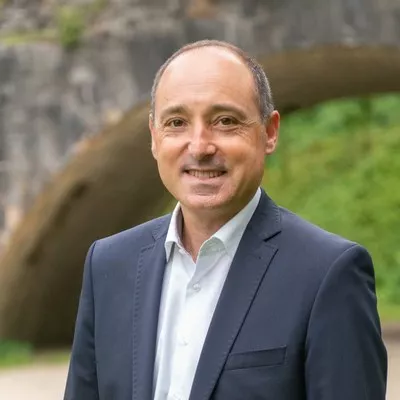What projects would you like to initiate on your arrival as Dean?
The ideas behind potential projects are jostling each other, but beyond the impetus, there is above all the mutual enrichment through collaborative work with the members of the faculty. The ideas mainly concern 5 fields of action for which we will develop projects together, the 5E's for a modern and meaningful faculty for its different stakeholders (students, members of the different categories of staff, alumni, etc.):

- Experience or how we can delight our relationship with the faculty, learn from our mistakes to create positive experiences,
- Excellence or how we make sure that everyone can explore the field of possibilities, develop their skills to the fullest and make the faculty grow in an effective and efficient way
- Well-being or how we make our professional/student sphere a place of personal fulfilment, in a real professional-private balance and in healthy, frank and transparent relationships
- Ecology, or how we rethink our way of working and interacting with each other, in order to be part of a sustainable and responsible operating model, both environmentally and socially
- Commitment or how, on the basis of the other 4 E's, we create loyalty, enthusiasm and even passion for our Faculty and our University, which we spread and share internally and externally.
Fields of action for which the projects can only be positive, constructive and ... ambitious.
How do you see teaching and research in your faculty?
The 5Es are both research and teaching. Research is now done in the University's research institutes. Of course, researchers are often physically attached to a faculty, hence the importance of working together with the presidents of the institutes, namely, as far as my faculty is concerned, DeFFiP, IRDENa, NaDI, naxys and Transitions. I will therefore ensure that researchers have the best possible working environment and create a stimulating environment for the development of quality research. In terms of teaching, even if we have already done a lot, particularly in the area of success assistance or the development of our "Learning by doing" reform, we still have some major challenges to face: the follow-up of students throughout their course, and even beyond, and in particular the problem of drop-outs and drop-outs, curricular approaches, hybridization, the judicious use of technologies and modern teaching approaches to engage students in their learning, the bridges between research and teaching, pillars of a university education, to be strengthened or even developed from the beginning of the course ... without forgetting the success rate which in baccalaureate still remains and will continue to be problematic. I dream of an education where excellence is not achieved at the expense of the success of the greatest number of students...
How do you see your role as a Dean?
The Faculty of Economic, Social and Management Sciences is built on a federal model. The four departments, which are Economics, Management Sciences, Political, Social and Communication Sciences and the Staggered Timetable in Economics and Management, form the backbone of the faculty and that is where its heart beats. I see my role, or rather my roles, as those of modern, responsible managers, namely leader (in the motivational sense of the term), liaison officer, active observer and spokesperson externally, disseminator internally, but also intrapreneur, regulator and distributor of resources, all in the service of others. Quite a programme ...
Under which sign do you wish to place your deanship?
Passion, in what we do, ambition, in what we want to achieve together, benevolence and respect for everyone, in what we share.
A word for your predecessor, Alain de Crombrugghe?
Thank you, Alain, thank you a thousand times over for your availability, for listening and for your involvement during not one but two terms of office! The projects that you have tirelessly initiated or supported (such as "learning by doing", a major reform of our teaching, or the in-depth reorganisation of our administrative services or even our future faculty building) already place our faculty in the modern era and will of course be at the heart of my own mandate. On behalf of our faculty community, I would like to thank you again and wish you all the best in your new position.
A word for the students of your faculty?
The students are at the heart of our profession, they are our joy, our pride and sometimes our sadness. The 5Es concern them first and foremost. I would tell them to get involved with us again and again in the development of their, our faculty. By working together, in a frank, creative and constructive way, we will make it shine both at UNamur and outside our walls.
Express biography
Pietro Zidda, 51 years old, from Montpellier, is married and has two children. He began his scientific career immediately after studying management engineering at the UCLouvain-Mons (formerly the FUCaM). Initially specialised in finance and business informatics, he turned to marketing and more particularly to the mathematical modelling of consumer choice behaviour, particularly in the field of customer relationship management (e.g. brand loyalty) but also in the field of the adoption and evaluation of new technologies by consumers (e.g. mobile payment, collaborative platform, interactive recommendation system). D. in Management Science from UCLouvain-Mons and the Intercollegiate Center for Management Science, after a stay in the United States, he started his career at UNamur in 2000. He has been doing research and teaching at UNamur since then, first as a lecturer, then as a professor and full professor. Pietro Zidda teaches the fundamentals of management in Block 1 as well as specialisation courses in the master’s programme, particularly in quantitative research methods. In terms of services, he has been a member or has chaired various commissions, has been director of the Department of Management Sciences twice, director of a research centre at UNamur (CeRCLe-NaDI) and also of an inter-university centre (CCMS) for several terms. More recently, he chaired the Council of the Academic Body.